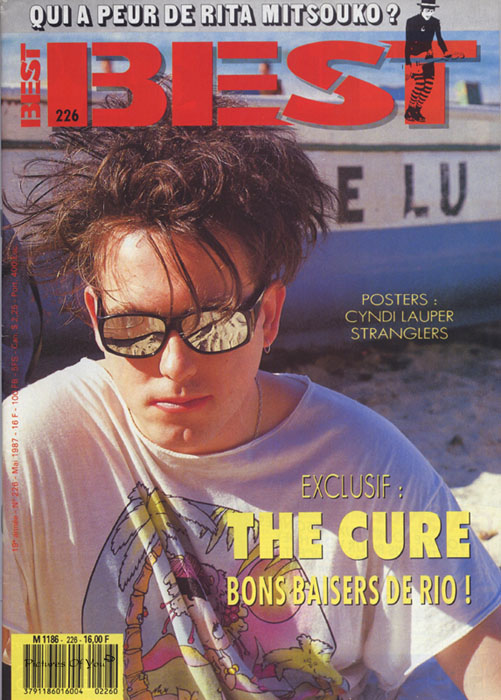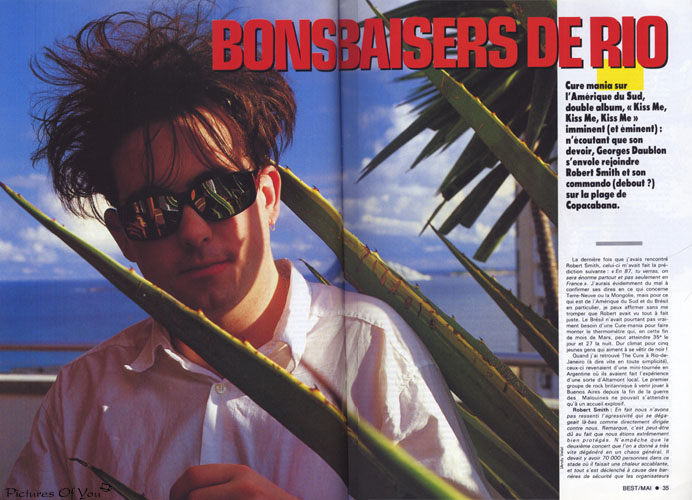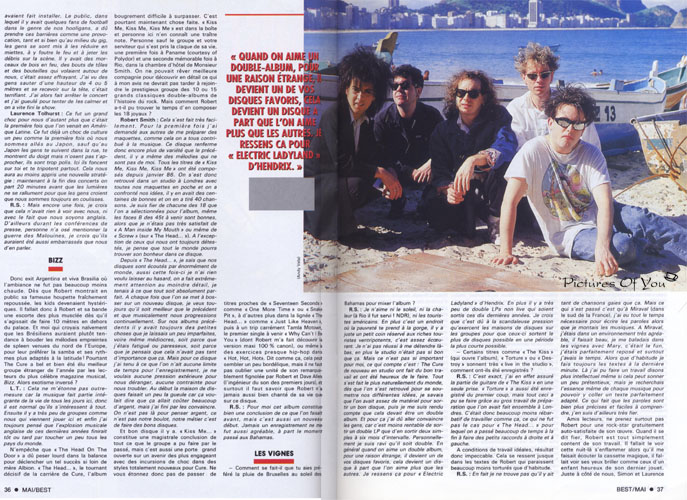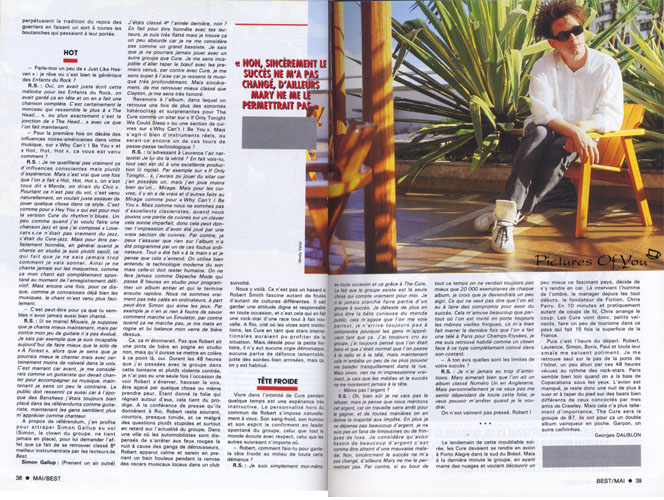Kisses From Rio
Cure mania in South America, an imminent (and eminent) double album, "Kiss
Me, Kiss Me, Kiss Me": following only his duty, Georges Daublon goes to meet
Robert Smith and his commando on the beaches of Copacabana.
The
last time I had met Robert Smith, he had made the following prediction: "In
1987, you'll see, we are going to be huge everywhere, not just in France."
I'd have trouble confirming that in what regards Terra Nova or Mongolia, but
as for South America and Brazil in particular, I can say without doubt that
Robert had been entirely right. Brazil doesn't need Cure-mania though to
raise the temperature, which, now at the end of March, can reach 35C during
the day and 27C at night. Tough climate for five young guys who like wearing
black!
When I met The Cure in Rio de Janeiro (to note, very no-frills), they were
coming back from a mini-tour in Argentina where they had experienced a sort
of local Altamont. The first British group to play Buenos Aires since the
Falklands war could only expect to be received with an explosive welcome.
Robert
Smith: Actually we didn't
feel that the aggressivity in the air was directed towards us. Maybe it's
because we were extremely well protected. Even so, the second concert we did
there degenerated very quickly into general chaos. There must have been
70,000 people in this stadium, under an infernal heat, and everything
started because of the security barriers that the organizers had installed.
The public, where there were some football fans like our hooligans, must
have taken these barriers as a provocation, so much that in the middle of
the show they started tearing them to bits, setting fires and throwing
rubbish on stage. There were bits of burning wood, steel sheet and bottles
flying around us, it was quite scary. I saw people jumping 4 or 5 meters and
landing on their head, it was terrifying. I stopped the concert and yelled
at them trying to make them calm down, and we finished the show quickly.
Laurence Tolhurst: It was
a big shock for us, all the more since it was the first time that we came to
South America. So it was a culture shock a little like the first time we
went to Japan, except that in Japan people follow you on the street, point
fingers but don't dare approaching you, they are too polite. Here, they jump
on you and pat you everywhere. At least, it taught us a new strategy: now,
at the end of the concerts we leave 20 minutes before the lights come back
on so people think we are still backstage.
R.S.:
But again, I think it had
nothing to do with us, or with the fact that we are from the UK. Besides,
during the press conferences, nobody dared mentioning the Falklands war, I
think they would have been just as embarrassed as us to talk about it.
Bizz
So,
exit Argentina and viva Brasilia, where the
atmosphere wasn't much less warm. Once Robert showed in public his famous
mop of hair, recently regrown, the kids would become hysterical. So Robert
and the band needed a seriously muscled escort to walk as much as 10 meters
from the palace. And me, who naively thought that the Brazilians would
rather frown at the spleen-impregnated melodies from northern Europe and
prefer instead samba and its rhythms adapted to the latitude! And yet, The
Cure has been selected best foreign group of the year by the readers of the
most famous music magazine, Bizz. Reverse exotism?
L.T.:
It doesn't surprise me
too much, because music is part of everyday life here and it is normal that
they would be interested in everything. Also, there are very few bands like
us who come and play here and finally, I've always thought that the British
musical explosion of these last few years would end up sooner or later
touching all the countries in the world.
Still,
"The Head On The Door" must have weighted heavily in the balance to engender
such a success far from mother Albion. "The Head...", the decisive turning
point in the career of The Cure, an album hard to surpass. But it's a done
fact now. "Kiss Me, Kiss Me, Kiss Me" is in the box and no one here has
heard a note of it. No one except for the band and your servant, who had the
audition of his life, first in Panama (courtesy of Polydor) and a second
memorable time in Rio, in Mister Smith's hotel room. You couldn't dream of
better company to discover in detail what in my opinion will quickly join
the prestigious list of the 10 or 15 grand classic double albums in the
history of rock. But how did Robert find the time to compose these 18
jewels?
Robert
Smith: That happened very
easily. For the first time, I asked the others to bring in demos, so we all
contributed to the music. So this record encompasses more variety than the
precedent, there are even melodies that aren't mine. All the songs on "Kiss
Me, Kiss Me, Kiss Me" have been written since January 1986. We got together
in a studio in London with all our demos in the bag and we exchanged ideas,
there were hundreds of good ones, and we chose 40 songs. I am proud of each
of the 18 that were selected for the album, even the B-sides of the upcoming
singles are good, while I wasn't very satisfied with "A Man Inside My Mouth"
or even "Screw" (from "The Head..."). Aside from the people who always
detested us, I think that everyone could find something to make them happy
on this disc.
Since "The Head...", I know that a great number of people listen to our
records, so this time I didn't want to leave anything to chance, we paid
extremely careful attention to every detail, I wanted everything to be
absolutely perfect. Every time we start recording a new album, I always want
it to be better than the one before and I want us to continue progressing
musically. On our previous records there were always little things that I
left a bit imperfect, or even mediocre, either because I was tired or lazy,
or because I was thinking that it didn't really have that much importance.
But for this record I insisted that we don't have a limit on recording time,
I didn't want any external pressure to bother us, any constraints to trouble
us. In the beginning, the record company wasn't so happy because it meant it
was going to cost a lot of money, but I ended up convincing them. We aren't
there to think about money, that's not our job, our job is to make good
records.
And a
good record it is. "Kiss Me..." is a masterly conclusion of everything that
the band has done in the past, but it is also a wide-open door towards a
most engaging future, with surprise forays into styles entirely new for The
Cure. Don't be surprised to jump from songs close to "Seventeen Seconds"
such as "One More Time" or "The Snakepit", to others more in the line of
"The Head..." like "Just Like Heaven", then a trip totally Tamla Motown with
the first upcoming single "Why Can't I Be You" (Robert let me discover the
maxi version, 100% pure), or even almost hip-hop exercises like "Hot Hot
Hot". Said like that, it could seem a bit of a mess, but one shouldn't
forget the unity of sound, remarkably crafted by Robert and Dave Allen
(sound engineer since the old days), and above all it has to be known that
Robert has never sung as well as he does on this record.
R.S.:
For me, this record
constitutes both a conclusion of what we have done previously, but also a
new beginning. I've never enjoyed recording so much, except for the time
spent in the Bahamas.
The Vineyard
- How
is it that you preferred Brussels rain to the sun of the Bahamas to mix the
album?
R.S.:
I don't like the sun, nor the heat (he got served in Rio! n.ed.)
or the American tourists.
Besides, it's a place where the poverty grabs you by the throat, there is
just a little corner reserved for rich potbellied tourists, it's quite
harrowing. I couldn't relax there, and also the studio wasn't that good. But
that's not important for me, what matters is that The Cure back in the
studio did a good job and they were happy doing it. Everything happened as
naturally as possible, once we met again to submit our ideas, I knew that we
had enough material to put out a good record, then I realized that it should
be a double record. And for that I had to convince people, because it's less
profitable to release a double album than to release two regular ones six
months apart. Personally I am delighted that it is a double. Generally, when
you love a double album, for some strange reason it becomes one of your
favorite records, a special record that you love more than the others. I
feel like that about "Electric Ladyland" by Hendrix. Besides, there are very
few double LPs that came out in the last ten years. I think that's because
of the scandalous pressure that record companies exert over the bands so
that they would release the maximum number of records in as short a period
as possible.
-
Certain songs like "The Kiss" (which opens the album), "Torture" or
"Destroy" sound very "live in the studio". How were they recorded?
R.S.:
That's correct, I did in
fact record the guitar part in "The Kiss" in one take. "Torture" was also
recorded on the first take, but this was all possible because of the serious
preparation work we had done together in London. So it was a lot less
off-putting to work like that, which was not the case for "The Head...",
where we spend a lot of time at the end to made little modifications left
and right.
Thanks
to ideal working conditions, an impeccable result. This is felt even in
Robert's lyrics, which seem a lot less tortured than usual.
R.S.:
Actually I don't think there are so many happy songs. But what happened
was that in Miraval (in the South of France),
I had all the time necessary to
write the words while working on the music. At Miraval, I was in a very
pleasant environment, it was beautiful, I would take walks in the vineyard
with Mary, it was fun, I was entirely rested and above all I had enough
time. While, usually, I always write the lyrics at the last minute. There, I
could do more, let's say, intellectual work, even though that might sound
pretentious, but I was looking for the very essence of each piece of music
to be able to add to it perfectly fitting lyrics. Which explains why the
words are so much more precise and easy to understand, and I am quite proud
of that.
Dear
readers, by all means don't take Robert for a gratuitously self-satisfied
rock-star. When he says he is proud, Robert is simply content with his work.
You had to see him catch fire that night, while he was having me listen to
the magical tape, you had to see his eyes shining like those of a child
happy with his latest toy. Right next to us, Simon and Laurence
honored the tradition of the warriors' rest by drinking up any bottles that
got within reach.
Hot
- Talk
to me a bit about "Just Like Heaven"; am I dreaming or is it the opening
track for Les Enfants du Rock (French TV show)?
R.S.:
Yes, we had just written
this melody for Les Enfants du Rock, we kept that in our mind and we did a
complete song. It is definitely the song that most resembles "The Head...",
or more exactly it is the junction point of "The Head..." and what we do
now.
- For
the first time one discovers some black American influences in your music,
on "Why Can't I Be You" and "Hot Hot Hot". How did that happen?
R.S.:
I wouldn't qualify that
as conscious influences, but rather more experience. But it's true that once
we did "Hot Hot Hot" we all said, "shit, it sounds like Chic!" Still, it's
not theft, it happened naturally, we just wanted to try and play something
in that style. The same for "Hey You" which is for me the Cure version of
rhythm'n'blues. A bit like when I wanted to do a jazz song and I wrote
"Lovecats", it wasn't really jazz, it was Cure-jazz. But, to be perfectly
honest, generally when I sing in the studio I'm rather drunk, which means
that I never really know how I'm going to sound. So I never sing on the
demos, like that my singing is completely spontaneous at the time of the
definitive recording. But once again, for this record, since I already knew
the music well, the vocals came to me more easily.
-
Maybe that's why you seem to have never sung so well.
R.S.:
(he is amused) Mm-yeah, I
suppose I am a better singer now, but on the contrary my guitar playing
hasn't improved. For example, I know that I am incapable today of doing
better than the "A Forest" solo, while I feel I could sing it better, but
certainly with less naivety in my voice. It's funny because before, I
considered myself a guitarist who had to sing to accompany his music, and
now I'm a bit the opposite. The audience must feel it too because around the
time I was in the Banshees I was always well placed in surveys as a
guitarist, but now people seem to appreciate me more as a singer.
Speaking of surveys, I take the opportunity to catch Simon Gallup (Simon,
the group clown, never stays in one place), to ask him how it feels to find
himself ranked 8th best instrumentalist by the readers of Best.
Simon
Gallup: (taking a scandalized air)
I ranked 4th last year, no?
Actually, to be honest with your readers, I am very flattered but I think
that's a bit absurd because I don't consider myself a great bassist. I know
I could never play with another band but The Cure. I feel incapable to go
hammer it out with just anyone, on the contrary with The Cure, I feel
totally at ease because I feel the music very deeply. But honestly, to find
myself better placed than Clapton, I feel very honored.
Let's
come back to the album, where we find once more heterogenous and surprising
sounds for The Cure, such as a sitar on "If Only Tonight We Could Sleep" or
a brass section on "Why Can't I Be You". But are they real instruments, or a
technology trick?
R.S.:
(to Laurence, mockingly) Shall I tell him the truth? In fact, you see,
all that is due to excellent production (he laughs).
For example on "If Only Tonight...",
I could have played a sitar because I have one, but I play it a lot less
well than a... Mirage. But for the brass, there are real instruments and
also parts done on Mirage like on "Why Can't I Be You". But since we aren't
good keyboard players, when we play a brass part on a keyboard it sounds
imperfect, so it can give the impression of having been played by a true
brass section. But I can assure you that nothing on the album was programmed
by one of those fucking computers. Everything was done "by hand" and I think
you can hear that. Of course we use modern sound technology, but it has to
stay human. We will never do something like Depeche Mode, who spend 8 hours
in the studio programming an entire album and have it done presto. We're not
too good with computers, maybe aside from Simon who likes the games. For
example I have no idea how an Emulator works, but when it doesn't, I get
angry and threaten to spill my beer glass on it.
Now
that would surprise me. Not that Robert would have a beer in the studio, not
that, but that he would get angry at that point. During the 48 hours that I
spent with the group in this distant and rather violent land, I haven't seen
Robert even once get angry, raise his voice, annoyed by something or even
scared. Given the madness that reigned around them, it's nothing short of a
miracle. At the press conference they gave in Rio, Robert remained smiling,
polite, almost shy, and this despite rather stupid questions, and definitely
behind the times with regards to the group's current affairs. In a city
where drivers have permission to not stop on red at night because of thug
gangs, Robert looked calm and serene while dipping in the turbulent waters
of a surcharged club for the local musical Oscar award ceremony.
Here we are. It is not by chance that Robert Smith fascinates so many people
of so many different cultures. He knows how to keep a dignified and
responsible attitude in all occasions, and that's what makes him a rock star
of an entirely new breed. In Rio, city where vices are institutions, The
Cure, as international stars, could have taken advantage of the situation.
But, sorry for gossip mouths, there were no demonic orgies, no smashing
parties, just some well-watered evenings, but that we can all do.
Cool head
To
live in close intimacy with The Cure for a while is a very instructive
experience. Robert's uncommon personality imposes itself to you naturally.
His calm, his humour and his spirit confirm him as the spontaneous leader of
the group, the one that everyone listens to with respect, the one that the
others would follow anywhere.
-
Robert, how do you manage to keep a cool head in the middle of all this
madness?
R.S.:
I am simply myself all
the time, and that's thanks to The Cure. The fact that the group exists is
the only thing that really matters for me. I've never planned to be part of
a successful group. I detest more and more being some curious animal in the
public eye, it annoys me that my face is everywhere, and I still don't
understand why people appreciate me so much. I've always believed in the
group, I've always thought that we were good and that it was normal that we
we'd be played on the radio and on TV, but now it upsets me a little that I
can't just take a quiet walk down the street. But otherwise, nothing
impresses me really, I know that the media and the success will never go to
my head.
- Not
even the money?
R.S.:
Oh, of course I'm not
going to refuse it, but I think that we deserve it, because we work hard for
it, and anyway we give most of it to taxes. And besides I don't spend much
money, I am not a fan of limos or luxury clothing. I think that needing a
lot of money is like having a serious sickness. No, honestly the success
hasn't changed me, besides Mary wouldn't allow it. But if after all this
time we'd still be only selling 20,000 copies of each record, I think I'd
become a bit bitter. Which isn't to say that we had to make compromises to
be successful. It amuses me a lot that everywhere we are invited we always
wear the same old clothes, and it was really funny last time we did a TV
show in Paris for Champs-Elysees, I was dressed like a clown in front of
this stuck-up guy in a suit.
- In
your opinion what are the limits of your success?
R.S.:
I've never had too many
ambitions. Mary would love us to have a No.1 record in England. But
personally I don't want to feel dependent on all that craziness, I want to
be able to stop when I want to.
We are
really not in a hurry, Robert!
***
The
day after this unforgettable evening, The Cure had to fly to Porto Alegre in
the South of Brazil. But at the last minute the group, having had enough of
the clouds and wanting to discover this fascinating country a bit better,
decided to get there by car. That's where the shadow man intervenes, manager
since the old days, Fiction founder Chris Parry. In 10 minutes and just as
many phone calls, Chris makes the arrangements. The Cure, little lucky
devils, go then do a bit of tourism around this country that has 15 times
the area of France.
It's time to leave. Robert, Laurence, Simon, Boris, Porl and their whole
crew wave at me politely. I find myself alone on the steps of the hotel, a
little confused by these 48 hours spent in the rhythm of rock stars. Paris
seems very far when you have the Copacabana beach under your eyes. I miss my
flight, so I stay another night to sweat and tap my feet to very different
beats from those concocted by my Crawley friends. But that doesn't matter
much. The Cure will be the band of 1987, and for that they have a winning
double album in their pocket. Garçon, I'll have another caifirinhas.
--
Georges Daublon






